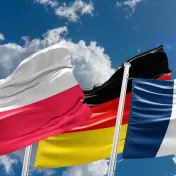On Friday, 10 March 2023, the EU’s Foreign Affairs Council (FAC) adopted its conclusions on climate and energy diplomacy for this year, entitled: ‘Bolstering EU climate and energy diplomacy in a critical decade’. In this blog post, we present the key priorities to which the Council agreed and highlight the areas where the EU needs to provide more clarity and increase its ambition.
Building momentum for a fossil fuel phase-out by 2050
The Council makes clear that phasing out all fossil fuels before 2050 and a ‘near-term’ peak in their consumption is necessary. At the same time, it recognises a transitional role for gas. At COP27, the EU was already one of the Parties that supported the proposal by India to call for a ‘phase-down’ of all fossil fuels. In the end, it did not get the support it needed, even though it had the backing of 80 countries. This priority set by the EU serves as a basis for building a stronger coalition on fossil fuel phase-out at COP28 in Dubai and at this year’s G20, where India holds the presidency this year.
Calling for a phase-out of all fossil fuels is an important push, but the EU will only be taken seriously if it leads by example domestically. In his speech at the launch of the IPCC Synthesis Report, the Secretary-General of the United Nations António Guterres called for developed countries to achieve net-zero as close as possible to 2040, rather than 2050 as the EU’s current target foresees. Even if the EU is to achieve climate neutrality by 2050—the legally binding target of the European Climate Law—it must phase out gas by 2040. After the ‘Fit for 55’ negotiations (expected to be concluded under the Swedish Presidency), the EU will update its NDC for 2030. Climate plans for the years 2035 and 2040 should be the next items on the agenda this year so that the EU can show leadership and consistency with medium and long-term climate goals.
On the international financing of fossil fuels, the Council only calls for an immediate end to investments in new coal infrastructure, however, the Council refrains from a similar call for oils and gas financing. Ending the international investments in new gas and oil infrastructure is a key step towards achieving global net-zero emissions by 2050. Otherwise, these investments risk becoming stranded assets or locking countries into fossil infrastructure. Shifting international finance flows away from fossil fuels will remain a key issue on the climate and energy agenda this year. Already at COP26, almost 39 countries, including several EU member states, pledged to end new direct public support to unabated fossil fuels in the energy sector abroad by the end of 2022. Several of these pledges are still to be implemented.
A coalition of European countries (Belgium, Denmark, Finland, France, Germany, Italy, the Netherlands, Spain, Sweden, and the United Kingdom), the so-called E3F (Export Finance for the Future), originally aimed to establish common criteria for investments that are compatible with the Glasgow pledge. However, Germany and Italy, in particular, are lagging behind. Germany’s development and investment bank KfW (Kreditanstalt für Wiederaufbau) yet has to publish new guidelines for fossil fuel financing. Their adoption was originally expected by the end of 2022. The German government is strongly divided on this issue. While the German Federal Foreign Office and the Ministry for Economic Cooperation and Development (BMZ, by its initials in German) were pushing for more ambition, the Ministry for Economic Affairs and Climate Action (BMWK, by its initials in German) and, particularly, the Chancellery were eager to extend international investments into fossil fuels. A leaked draft showed that the guidelines would have allowed funding for non-1.5°C compatible projects for another two years. The approval was delayed under public pressure, and the new guidelines have yet to be signed off by KfW's supervisory board.
Italy has just published a policy for its export credit agency SACE (Servizi Assicurativi del Commercio Estero) which allows for further financing for gas and oil infrastructure for several years and contains major loopholes. It has been described as ‘worst-in-class’. EU member states' continued financing of fossil fuels abroad is inconsistent with their calls for a global phase-out of fossil fuels.
Financing a 1.5°C world: climate finance, partnerships, and reforming the financial system
With regard to climate finance, the Council reaffirmed its commitment to reach and contribute to the international goal of USD 100 billion per year ‘as soon as possible’. The Council should have been more specific on this point. It is crucial that the USD 100 billion target is finally reached in 2023, as this is already three years later than originally promised. Moreover, the conclusions failed to specify that the delay in reaching the USD 100 billion target implies that the target must be exceeded in the following years, so that an average of USD 100 billion is raised between 2020 and 2025 (at least USD 600 billion in total).
A key problem with climate finance is the imbalance between mitigation and adaptation finance. In 2021, COP26 therefore called on states to double adaptation finance by 2025, which would imply an increase from USD 20 billion to 40 billion. The Council merely reiterated this call without specifying a number, and missed the opportunity to mention concrete roadmaps and projections to show how it plans to achieve this goal. It also refrains from formalising expectations for a new post-2025 financing target. With regard to financing loss and damage, the EU maintains its position from COP27, where it has pushed towards the establishment of a fund. This will remain a priority for the EU to operationalize the fund to help countries address loss and damage caused by the climate crisis.
To scale up climate finance and align all financial flows with the Paris Agreement, the Council emphasises the role of finance ministers. In particular, the work of the Coalition of Finance Ministers for Climate Action could unlock up to USD 39 billion per year for climate action by using new financial approaches and instruments, such as carbon pricing and fossil fuel subsidy reforms. Another priority for the EU this year will be to advance the reform of the international financial architecture with the aim to increase the fiscal space for countries facing multiple crises. The Council calls for a clear timeframe for the reform of international financial institutions, in particular of multilateral development banks. Progress should be made in the first half of the year. A key moment to advance the reform agenda will be the ‘Global Financing Pact Summit’, hosted by French President Emmanuel Macron and Barbados Prime Minister Mia Mottley on 22-23 June 2023.
The Council is short on details on Just Energy Transition Partnerships (JETPs). Initially celebrated as a breakthrough, the implementation of these plurilateral partnerships is proving to be challenging. Among the three JETPs that have already been announced - South Africa, Indonesia, and Vietnam - the partnership with South Africa is so far the only one with a published investment plan. The partnerships with Indonesia and Vietnam have yet to be detailed, leaving many observers to view the process as a black box. Potential partnerships with Senegal and India have only progressed slowly. Despite the notion that JETPs aim for a ‘country-led transformation’, the EU and other International Partners Group (IPG) countries should commit to establishing principles for JETPs. For example, these partnerships should ensure the involvement of civil society organisations as well as affected local communities and refrain from financing fossil fuels.
Strengthening the link between climate and security
The security implications of the climate crisis are also highlighted in the conclusions. A group of EU member states initiated a Group of Friends for an ambitious EU climate diplomacy that aims to strengthen the nexus in the EU’s external relations, among others, through a systematic climate assessment of the impact of climate change on peace and security. In a recent comment on the IPCC Synthesis Report, the Group of Friends reiterated that the climate crisis is one of the greatest risks to global security. The Council aims to strengthen the EU’s capacities for early warning, strategic foresight, and analysis of climate risks. Ensuring progress in this regard will be the responsibility of High Representative Josep Borrell. An early warning system for tipping points could be one area to make progress with other countries. The Commission and the High Representative are already working on a joint proposal on how the EU can address and anticipate the security implications of the climate crisis.
The way forward
With regard to a feminist climate diplomacy, it remains unclear how the EU will pursue a 'human-rights based and gender-sensitive' approach in their climate diplomacy. The conclusions lack concrete commitments in this area. There is also no reference to the main document guiding the EU’s external action from a gender perspective, the Action Plan on Gender Equality and Women's Empowerment in External Action 2021–2025. While some EU member states have already adopted their own feminist foreign policies (Sweden, which regrettably dropped all references to a feminist climate diplomacy recently; Spain; France; and Germany), the Union as a whole is lagging behind. The next Council presidency, to be held by Spain from July to December 2023, should boost a feminist approach to EU climate diplomacy.
This year will see the first ever Global Stocktake. The global community will assess how much progress has been made towards the three long-term goals of the Paris Agreement, and it will be time to map the way forward. To accelerate the pace of the global energy transition, the incoming EU Presidency, Spain, is working with the International Energy Agency (IEA) to host a Climate and Energy Summit in Madrid at the beginning of October. Demonstrating that its global climate ambition matches its domestic action will be crucial for the EU.
The conclusion text almost went unnoticed because member states could not agree on the language concerning nuclear energy and its role for hydrogen, which delayed the adoption of the text by two weeks. This issue has not been fully resolved in the final text. The conclusions still lack a clear position on hydrogen based on renewable energy and a reference to strong safeguards.






